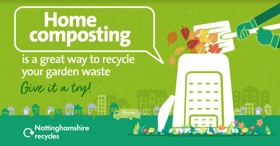Tuesday, 3 May 2022

Nottinghamshire County Council and its recycling and waste partner Veolia, share the recipe for home composting success as part of International Compost Awareness Week 2022.
Composting, whether large scale on an Eco-farm or micro scale from a single apartment, is the most environmentally friendly way to dispose of food and garden waste. As any gardener will know, composting is an inexpensive, natural process that transforms organic waste into a valuable and nutrient rich food for your garden or house plants. It’s simple to make and use.
We throw away 6.6 million tonnes of household food waste a year in the UK. This food waste is responsible for nearly 25 million tonnes of CO2 emissions, equivalent to 5.4% of the UK’s territorial emissions. Rather than throwing this away, much of this food waste could be composted at home. Not only will your general waste bin be less weighty, you can save money on fertilisers and compost for your garden by making your own.
The compost produced at home benefits your garden by adding nutrients, improving soil structure, maintaining moisture levels and keeps your soil's pH balance in check. Home composting is also an anaerobic process that does not produce methane - an additional benefit in the fight against climate change.
Councillor Neil Clarke MBE, Chairman of the Transport and Environment Committee at Nottinghamshire County Council said: “Composting at home is a way for everyone to take part in the battle against climate change - a year of home composting saves as much CO2 as the amount produced by your kettle in a year. The compost you make is also brilliant for your garden and by adding it to your soil you are making your soil healthier and the things you grow healthier too.”
With so many different ways to compost at home there is a method to suit every household from a simple pile of grass and cuttings in the corner of your garden to a three tier wooden structure, a rotating tumbler to a bokashi bin or even a green cone that can handle every type of food waste.
Each solution requires its own recipe for composting success. The most popular method is via an open bottomed container placed in a sunny spot in your garden. To get the best results it’s important to add a variety of different items into the container and to keep a 50/50 balance between the “greens” (e.g. grass cuttings, fruit and vegetable peelings, coffee grounds) and the “browns”(e.g. leaves, shredded paper, cardboard, small twigs). Turning the compost every few weeks will add the air required for the composting microbes to work effectively. Within 9 - 12 months the nutrient rich soil conditioner will be ready to add to your garden.
Lea Hawkes, General Manager for Veolia Nottinghamshire said: “As the saying goes, we don’t need a handful of people doing it perfectly, we need millions of people doing it imperfectly. Even if you only have space for a small wormery in your back-yard when combined with millions of people throughout the world your efforts really will make a difference.”
Nottinghamshire County Council and Veolia are helping many more people to compost through their Reduce, Reuse, Recycling Fund. A community initiative designed to help people think more creatively about their waste. Funding can be granted for a variety of projects and each year schools, community groups and charities bid to fund composting initiatives. In 2021 Edwalton Primary School in Rushcliffe were successful in their bid for modular compost bins for their allotment and school farm.
- End -
For more information on composting at home visit: https://www.veolia.co.uk/nottinghamshire/waste-reduction/home-composting
For more information on the Reduce, Reuse, Recycle Fund visit: https://www.veolia.co.uk/nottinghamshire/community/reduce-reuse-recycling-fund